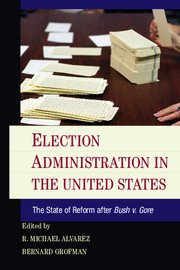Book contents
- Frontmatter
- Contents
- List of Contributors
- Foreword
- Acknowledgments
- Editors’ Introduction
- Part I Bush v. Gore in Perspective
- 1 Disputed Elections Post Bush v. Gore
- 2 The Cites that Counted
- 3 Bush v. Gore in the American Mind
- Part II What Has Changed since Bush v. Gore?
- Part III Remaining Challenges
- References
- Index
3 - Bush v. Gore in the American Mind
Reflections and Survey Results on the Tenth Anniversary of the Decision Ending the 2000 Election Controversy
Published online by Cambridge University Press: 05 October 2014
- Frontmatter
- Contents
- List of Contributors
- Foreword
- Acknowledgments
- Editors’ Introduction
- Part I Bush v. Gore in Perspective
- 1 Disputed Elections Post Bush v. Gore
- 2 The Cites that Counted
- 3 Bush v. Gore in the American Mind
- Part II What Has Changed since Bush v. Gore?
- Part III Remaining Challenges
- References
- Index
Summary
Introduction
Very few, if any, Supreme Court cases have captured public attention on a scale comparable to that of Bush v. Gore. The Supreme Court’s involvement was the last scene in a political and courtroom drama that played out for more than a month on television. Even if the legal claims, let alone the holding, in the case were difficult for the public to understand, the import and consequences of the case were not: George W. Bush would be the next president. As a rare, high-salience case with understandable political consequences and clear winners and losers, Bush v. Gore provided a unique test of the Court’s legitimacy in the public mind.
Scholars who studied the aftermath of Bush v. Gore found conflicting evidence of the decision’s short-term effect on public attitudes toward the Court (see, e.g., Gibson, Caldeira, and Spence, 2003a, 2003b; Kritzer, 2001; Mate and Wright, 2008; Price and Romantan, 2004). A flurry of articles published between 2001 and 2004 debated whether Bush v. Gore indeed “wounded” the Court’s legitimacy (Gibson et al., 2003a, 2003b; Kritzer, 2001; Price and Romantan, 2004; Yates and Whitford, 2002). Some researchers found that the decision altered short-term attitudes toward the Court with opinion polarized along racial and partisan lines (Kritzer, 2001; Mate and Wright, 2008; Price and Romantan, 2004; Yates and Whitford, 2002), while others found little or no effect on feelings about the Court (Gibson et al., 2003a, 2003b). All seemed to agree, however, that Bush v. Gore led to no long-term effects on public opinion about the Court (Gibson, 2007; Mate and Wright, 2008). Within a year, the Court appeared to recover to its pre–Bush v. Gore levels in public support, and the structure of support did not reveal sustained levels of racial or partisan polarization.
- Type
- Chapter
- Information
- Election Administration in the United StatesThe State of Reform after Bush v. Gore, pp. 48 - 76Publisher: Cambridge University PressPrint publication year: 2014
- 2
- Cited by



